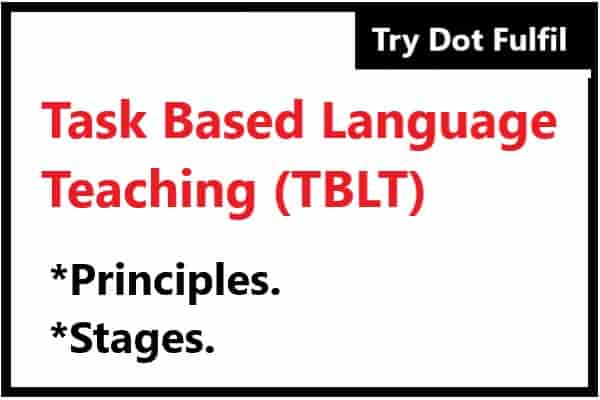What is Task Based Language Teaching? The principles and Stages of TBLT, TBLT, Task based language teaching, stages of tblt, principles of tblt, Task of TBLT, Try Dot Fulfil.
What is Task Based Language Teaching? Discuss the theoretical principles, chief features and Stages of TBLT.
orWhat is tblt? Discuss the types of tasks with special reference to the focused task.
 |
| What is Task Based Language Teaching? Discuss the principles and Stages of TBLT, Try Dot Fulfil. |
Answer:
Task based Language Teaching is a teaching approach which
focuses on offering learner's tasks so that they can actively engage in using
and practicing language in communicative situations, and on measuring the
language outcomes that will arise from those tasks. For example, a speaking
task can develop student's ability to speak fluently and accurately when
communicating with their peers. Task based language teaching refers to teaching
the target language through specific tasks, such as going to the doctor, doing
groceries or shopping, going to the bank etc.
TBLT was first
proposed by an Indian scholar Prabhu. The object of the method was to teach
learners communicative competence in English through meaningful and authentic
activities. TBLT can be considered a branch of communicative language teaching
(CLT).
Task of TBLT:
Task based language learning and teaching
published in 2003, Rod Ellis in his book has defined tasks or activities having
four kind of criteria: -
1. Focus on meaning.
2. Some kind of gap
such as information etc.
3. Use your own linguistics resources.
4. Having
communicative outcome not simply display of language.
Task is divided into two categories in TBLT:
Nunan classifies task
into pedagogical tasks (occurs in classroom) and real-world tasks or target
tasks (Occur beyond the classroom). According Ellis, two types of tasks are as
follow:
Unfocused Task:
Unfocused tasks are
tasks that are designed with general sample of language that is to say
they have not decided in such a way for useful and essential
grammatical structure.
Focused task:
The focused tasks are tasks
that have been designed to create a communicative context for the use of
predetermined grammatical structure.
The Theoretical principles
of TBLT:
According to David Nunan, there are seven
principles of TBLT. They are:
Scaffolding:
Lessons and materials should provide
supporting framework within which the learning takes place.
Task - dependency:
Within a lesson one task
should grow out of and build upon, the ones that have gone before.
Recycling:
Recycling language maximizes opportunities for
learning and activities the “Organic" learning principles.
Active learning:
Learners learn best by actively using the
language they are learning.
Integration:
Learners should be taught in ways that make clear the relationships between linguistic form, communicative function and semantic meaning.
Reproduction to creation:
Language should be
encouraged to move form reproductive to creative language use.
Reflection:
Learners should be given opportunities to reflect on what they have learned and how well they are doing.
Stages of TBLT:
Stages of TBLT depend on context. The stages of TBLT are not fixed.
According Ellis, students do not need go and stay in England, America, Canada, New Zealand or Australia for learning and acquiring English as target language.
Different stages of TBLT are given below:
Pre - Task: It aims to
introduce the topic about how to spend a day through learning language focusing
on words and phrases.
Task: Students do the task
in groups and plan for a day. They state their own plan and compare different
ideas with their group partners.
Planning: Each group
rehearses presenting their plan. The teacher walks around, helping if students
have a problem and noting any language items or grammatical problems on which
to give feedback later.
Report: Each group selects a
speaker to report their plan and give detailed reason for it. Other students
can choose the best one after the presentations.
Post task: The teacher hands
out the Fill in exercises and true of false questions for the students
according to the listening in class. According to the group discussion, they
write a 150-word assignment as homework.
See: Task Based Language Teaching Bangla lecture
Written by: Roksana Akter, NUBD.
Typed by: MD Omar Sunny, NUBD.
Edited by: Try Dot Fulfil English Literature.


















0 Comments